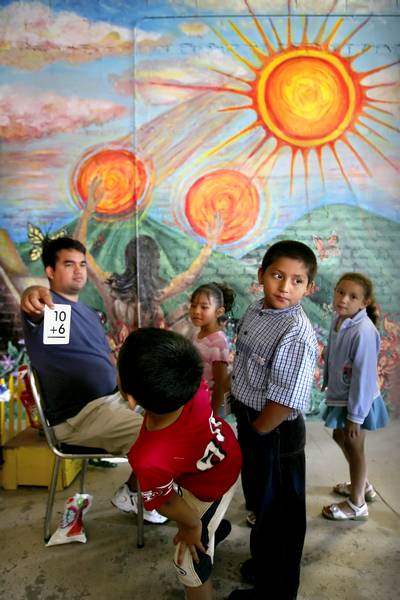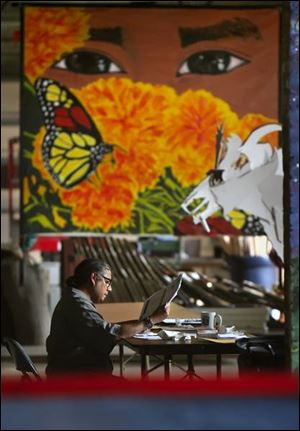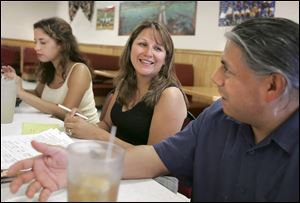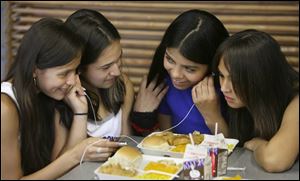
Local Latinos look toward a bright future
7/23/2006
Luis Flores, center, twists to study a flash card held by Alex Ramirez, left. Luis' friend, Edwin Sanchez, has other things catching his eye at the Sofia Quintero Arts and Cultural Center.
First of two parts
The South Toledo neighborhood where Sabina Serratos grew up has seen many changes over the years, but it is still "a little Mexico in the barrio" to her.
As a surging Latino population nationwide creates change in the social, economic, and political landscape, Mrs. Serratos is one of many Latinos in smaller urban centers such as Toledo who feel an emerging sense of empowerment.
"It is an exciting time to be Latino," said the mother of four. "We are clearly growing in many communities across the country."
Yet in Toledo, a city that hosted President Bush and Mexican President Vicente Fox in 2001 to discuss immigration reform and celebrate American-Mexican relations, Latinos remain a significant minority.
Unlike New York, Los Angeles, Dallas, Miami, Chicago, and even some smaller cities, where an unprecedented hundreds of thousands of Latinos swarmed through the streets rallying in support of inclusive immigration policies, Latinos in Toledo held a rally that was barely noticed by much of the city.
"Even though we as a people are growing in many parts of the country, our numbers here in Toledo are considerably smaller," said Joe Balderas, a well-known community organizer in Toledo's Latino circles. "We are a minority in a city that is still learning how to embrace us and our culture," he said.
Nevertheless, Latinos here say they are increasingly confident that a steadily growing community, emboldened by a new era of nationwide cultural and political awareness, will soon redefine the character of this city.
Redefining politics
As the fastest growing ethnic group in the country, Latinos represent half of the nation's population growth and account for 14 percent of the total population. They are expected to be a key political constituency in the upcoming midterm and presidential elections. Their unprecedented growth in a number of cities and states was highlighted when Antonio Villaraigosa, a son of a Mexican immigrant, was elected last year as mayor of Los Angeles - the only Latino mayor of a major city in the country.

Luis Flores, center, twists to study a flash card held by Alex Ramirez, left. Luis' friend, Edwin Sanchez, has other things catching his eye at the Sofia Quintero Arts and Cultural Center.
In 2002, voters in New Mexico elected Democrat Bill Richardson as the nation's only Latino governor. Also a son of immigrants - a Mexican mother and a Nicaraguan father - Governor Richardson may be a candidate for the presidency in 2008.
In Toledo, the biggest urban center in northwest Ohio, a competitive region of a state that decided the 2004 presidential race, Latinos say they too are growing into a political constituency that could make the difference in elections to come.
A Toledo native, Mrs. Serratos, 36, a senior financial aid counselor at the University of Toledo, was born into the Elizondo family- one of the largest Mexican-American families in South Toledo. Mrs. Serratos said Toledo's Latino community is not only growing, but ready to embrace its changing role.

Known as an activist, Joe Balderas is executive director of the Sofia Quintero Arts and Cultural Center, handling paperwork amid artwork and other representations of Latino culture.
"We are on our way. Things are changing for us in ways that I never imagined when I was growing up here," said Mrs. Serratos, a board member of Viva South Toledo, a nonprofit community group in the city's south end.
Mrs. Serratos was the campaign manager for a daughter of Mr. Balderas, Taylor Balderas, who was appointed by Mayor Carty Finkbeiner to fill the District 3 seat of former Councilman Bob McCloskey after the latter was elected as an at-large member of council.
McCloskey resigned and on Friday was sentenced to prison in state and federal courts on bribery charges.
Ms. Balderas, 22, lost a May special election to retain the seat by five votes. Mike Craig took over the seat. For the brief period Ms. Balderas represented East Toledo and part of South Toledo, she was the youngest member of council.
"It is becoming more evident that Latinos are the up-and-coming ethnic group in many cities and states in the country. Here in Toledo, we want to tap into that energy and begin to organize our community in a way that makes our presence felt," Mrs. Serratos said.

Sabina Serratos, center, served as campaign manager for Taylor Balderas, who ran for Toledo City Council in November.
On a recent sultry summer night, Mrs. Serratos and a group of South Toledo residents and community activists sat in a small conference room in an old city firehouse on Broadway, planning this year's Mexican-American Festival.
Dressed in a charcoal, pin-striped business suit with a pair of lightly tinted sunglasses flipped over her brown hair, she stood with her peers in the front office of Viva South Toledo Development Corp., the embodiment of a grass-roots organizer in a growing Latino community.
Mrs. Serratos said her experience managing the campaign of an upstart, young Latino candidate made her more aware of how Toledo's Latino community is coming of age in cultural and political identity.

From left, Manuela Urbieta, 12, Carol Salazar, 13, Angelica Palomar, 14, and Karen Salazar, 15, share an iPod to listen and watch a video for a Latino band at lunch at the Quintero center.
"We went into many neighborhoods where Latinos and people in the city were very excited to see us come with a message of change," said Mrs. Serratos, a part-time graduate student at UT, where she is also the adviser of the campus Latino students' organization.
"There was a sense of excitement about the fact that we had a young and smart female Latino candidate, unlike many candidates people are used to seeing run for City Council in this city," she said about Ms. Balderas' candidacy.
Partly spurred by an increasing number of seasonal migrant laborers who "settled out" of field work in rural northwest Ohio and southeast Michigan and moved into the city, Toledo's Hispanic population has gone from about 1.9 percent in 1970, to 5.5 percent in 2000, according to U.S. Census Bureau statistics. Though many interviewed say they prefer "Latino," the Census continues to use the term "Hispanic."
In Ohio, Hispanics grew from 1.9 percent of the population in the 2000 Census to 2.1 percent in the Census' 2004 American Community Survey. In Michigan, Latinos made up 3.3 percent of the population in 2000 and 3.6 percent in the 2004 survey..
As Latinos continue to settle in the region in larger numbers, Republican and Democratic party officials - such as those in Lucas County - say their organizations are well-positioned to tap into a community that could become a key swing vote in state, regional, and national elections.
"The Republican Party has always been a big umbrella, and as the Latino community continues to grow here, our goal will be to approach them in ways that will attract them to our party," said Bob Reichert, chairman of the Lucas County GOP.
Latinos have tended to vote for Republicans over Democrats in the recent past, he said, but he admitted the party's national stance on immigration reform has left a sour taste with many.
"We will work within the framework of the national party's plan concerning Latinos and the issue of immigration, but we already have committees in place that are now actively working on recruiting efforts and outreach to Latinos here," Mr. Reichert said.
His counterpart, John Irish, chairman of the Lucas County Democratic Party said Latinos, at least in this area, have long been attracted to his party.
"We have long appreciated the growing Latino community here," he said, noting that the Democratic Party recently endorsed the two Latino candidates now running for elective office in the city and at the county level.
"We hope to do a good job addressing the issues facing Latinos here, but we are especially proud of the fact that the Democratic Party has always had an open-door policy toward Latinos and all minorities," he said.
In many big cities and smaller urban centers such as Toledo, Latinos are beginning to feel the impact of political empowerment, said Robert Torres, a member of the Toledo Public Schools' Board of Education and one of the city's most visible and outspoken elected Latinos.
"I learned a long time ago that power lies in the perception of someone who knows their potential to achieve it," he said. A son of farm laborers from Swanton in Fulton County, Mr. Torres, 43, proudly claims himself as "a product of migrant Main Street."
While Toledo's Latino community is not the size of Latino communities in Chicago and other major cities, "Latinos here are a small community that is growing faster in political terms than it is in size," he said.
"When you look at how small we are in Toledo and then understand how our culture is permeating many aspects of life in Toledo, we are doing much better than Latinos in Columbus or Cleveland," said Mr. Torres, a manager in Toledo's development department.
"Latinos are crossing over and convincing other communities in the city to vote for our candidates. That is the kind of progress you won't find in Cleveland or Columbus," Mr. Torres said. "Our community, our food, our music is growing in many ways in different parts of this city."
Lucas County Recorder Anita Lopez, now running for the county auditor's office, said her experience growing up in the old south end shaped her identity as "an American of Mexican descent."
"I grew up with a heavy influence of Mexican culture in the old south end, but I also grew up in a family that emphasized English as our first language because our parents wanted us to assimilate into American culture," she said.
Ms. Lopez, a former Toledo Public school board member added, "As an elected official, I want people to look to my credentials first instead of my skin or ethnic heritage, and the voters of Lucas County have been very open to me in that way."
Toledo's Latino community has had a slow but steady growth that has made it much more visible in recent years, said Mr. Balderas, 54, executive director of the Sofia Quintero Art & Cultural Center, an art gallery and cultural meeting hall along Broadway in South Toledo, home to many Latinos.
"When I was a boy, my dad used to bring me downtown on weekends," said Mr. Balderas, who grew up in Perrysburg. "Back then, even though there were Latinos in the south end, I didn't see a lot of people who looked like me in the city," he said. "We now have a much bigger presence in South Toledo, and you can actually hear people speak Spanish in the streets. That is change."
Much of the change is not only happening in concentrated Latino neighborhoods of South Toledo and East Toledo, said Andrew Sager, a historical review specialist in the Toledo Department of Neighborhoods.
Latinos now live in West Toledo neighborhoods such as Old Orchard and surrounding suburban cities such as Sylvania, Rossford, and Northwood, which once had very few Latinos, he said.
Some communities such as Perrysburg Heights - a predominantly Latino neighborhood in Wood County's Perrysburg Township that sits across State Rt. 25 from the upscale Levis Commons retail and residential development in Perrysburg - have retained their historically Latino identity.
Lucas County municipalities such as Spencer and Jerusalem townships also have more Latino families than they once did, Mr. Sager said.
While Toledo's Latino community has been predominantly Mexican, the city has experienced some growth among Puerto Ricans, Cubans, and former residents of other countries in Central and South America, area Latino officials said.
Lourdes Santiago, 56, a Toledo attorney and currently the only Latino member of Toledo City Council, is Puerto Rican. She came to Toledo to join her sister in 1974.
The diversity of Latinos in northwest Ohio and southeast Michigan goes beyond ethnic heritage or country of origin, said Ms. Santiago, who recently was appointed by Mayor Finkbeiner to fill the at-large council seat vacated by McCloskey. "We are a very diverse community in our levels of educations, economic status, and mostly in our documentation status," she said.
A community organizer-turned-politician who worked on education issues in Latino migrant camps for many years, Ms. Santiago said the immigration debate has the potential to shape and define Latino communities everywhere.
"I have seen significant change and growth in our community here, but a large part of it is still undocumented [residents]," Ms. Santiago said from her office on the 21st floor of One Government Center. "We are emerging as a community and we are being taken more seriously, but we still have a lot of work to do in educating ourselves about participation in the political process."
Fresh from the failed campaign to elect Ms. Balderas to the Toledo District 3 Council seat in May's special election, Mrs. Serratos expressed her frustration over seeing a community that remains a long way from what many envision it as being.
"I was very upset with my people in the last election. We lost by only five votes, and I kept asking myself, 'Why didn't they come out to vote,' " she said. "We still have a lot of work to do. If only one more Latino family had voted, we would have won."
Contact Karamagi Rujumba at: krujumba@theblade.com or 419-724-6064.